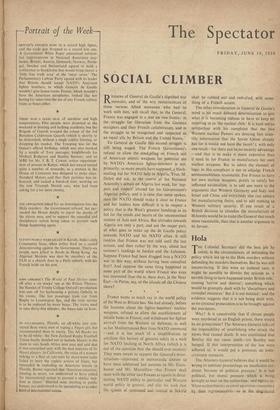SOCIAL CLIMBER
READERS of General de Gaullc's dignified war memoirs, and of the wry reminiscences of those various Allied statesmen who had to work with him, will recall that, to the General, France was engaged in a war on two fronts : in the struggle for liberation from the German occupiers and their French collaborators, and in the struggle to be recognised and respected as an equal ally by Britain and the United States.
To General de Gaulle this second struggle is still being waged. The French Government's refusal to allow the stockpiling on French soil of American atomic weapons for potential use by NATO's American fighter-bombers is not, primarily, as many people have supposed, a black- mailing bid for NATO help in Algeria. True, M. Debre did ask, in the course of the National Assembly's debate on Algeria last week, for 'sup- port and respect' abroad for his Government's Algerian policy, and it is time that some spokes- man for NATO should make it clear to France and her leliders how difficult it is to respect a policy that is the West's greatest handicap in its bid for the minds and hearts of the uncommitted nations of Asia and Africa. But attitudes towards Algeria are only a part, and not the major part, of what goes to make up the de Gaulle policy towards NATO and his NATO allies. It still rankles that France was not told until the last minute, and then rather by the way, about last summer's landings in Jordan and the Lebanon. Suppose France had been dragged into a NATO war in this way, without having been consulted first? And suppose the same thing happened in some part of the world where France was even less interested than she is, these days, in the Near East—in Persia, say, or the islands off the Chinese shore?
France wants as much say in the world policy of the West as Britain has. She had already, before the business about the fighter-bombers' nuclear weapons, refused to allow the establishment of missile bases in France, and withdrawn her fighter aircraft from the Western air defences, as well as her Mediterranean fleet from NATO command —and it is too much of a simplification to attribute this battery of gestures solely to a wish for NATO backing in North Africa (which it is out of the question that she should ever receive). They were meant to support the General's deter- mination—expressed in memoranda known to have been addressed last autumn to Mr. Eisen- hower and Mr. Macmillan—that France shall meet with the other two Powers as equals in deter- mining NATO policy in particular and Western world policy in general, and also his wish that the system of command and control in NATO
shall be rubbed out and redrafted, with some- thing of a French accent.
The other consideration in General de Gaulle's mind is his much debated determination to join what it is becoming tedious to have to keep on referring to as 'the nuclear club.' It is hard not to sympathise with his complaint that the two Western nuclear Powers are denying him scien- tific information that the Soviet Union already has (or it would not have the bomb! ); with only one result—for there can be no security advantage —and that is to make it more expensive than it need be for France to manufacture her own nuclear weapons. But to admit the element of logic in this complaint is not to adjudge French unreasonableness reasonable. For France to have her own nuclear weapons, purely to satisfy her inflamed nationalism, is to add one more to the arguments that Western Germany and Italy and. Israel and China and everybody else can adduce for manufacturing theirs, and to add nothing to Western military security. If one result of a British decision to abandon the manufacture of H-bombs would be to make the General that much more reasonable, then that is another argument in its favour.






































 Previous page
Previous page